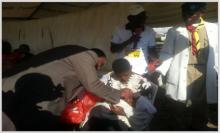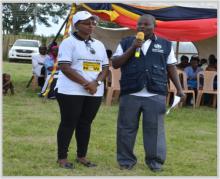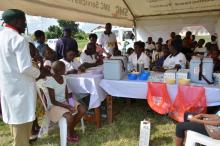Uganda improves access to immunization services
Kampala, 8th June 2016 - Twenty two (22) out of Uganda’s 112 districts have good access and utilization of immunization services reaching over 80% of the children with all recommended doses of life-saving childhood vaccinations according to their district specific targets. This is according to the findings of the recent annual National Administrative Immunization Performance Analysis done by the Uganda National Expanded Programme on Immunization (UNEPI), supported by WHO and UNICEF.
The analysis has enabled UNEPI to rank districts as either good or poor performing for appropriate attention and action where necessary. Six districts were found to have sub-optimal performance and two, Bulambuli and Mitooma were the last on the scale. They were therefore, chosen to host the launch of the Inactivated Polio Vaccine (IPV) and the climax for the 6th Edition of the African Vaccination Week (AVW) to boost advocacy and community awareness on immunization, respectively.
“Uganda has made tremendous achievements in Immunization which contributed to the reduction of under 5 morbidity and mortality”, said Dr Allan Muruta, the Assistant Commissioner National Disease Control at the AVW function in Mitooma. He assured the public about government’s commitment to ensure full immunization coverage because “immunization is one of the most cost effective public health interventions that can enhance the country’s attainment of the Sustainable Development Goals.”
“Immunization should be integrated with other health services, such as, child health care, Antenatal care, Family planning and postnatal care and implemented in a manner that will contribute to the strengthening of the health system for improved health service delivery in the country” said Dr. Wondimagegnehu Alemu, the WHO representative, in a remark read by Dr Emmanuel Tenywa the Routine Immunization Officer at WHO. He reiterated WHO’s full support to Uganda’s immunization programme.
According to the 2015 WHO/UNICEF estimates, the national coverage for DPT3 was 78% and measles was at 82% which shows that 22% and 18% respectively of the children are still missed for these vital vaccines. Hence Uganda is ranked among countries with the highest number of unimmunized children.
Note:
Immunization is a proven tool for controlling and eliminating life-threatening infectious diseases and is estimated to avert between 2 and 3 million deaths each year. It is one of the most cost-effective health investments, with proven strategies that make it accessible to even the most hard-to-reach and vulnerable populations. It has clearly defined target groups and can be delivered effectively through outreach activities. Vaccination does not require any major lifestyle change.
WHO with other partners is supporting the Government of Uganda to improve vaccination coverage and equity in-line with the Global Vaccination Action Plan endorsed at the 65th World Health Assembly. Several activities have been implemented to ensure that Uganda remains polio free, maintains the pre-elimination phase of measles and sustains the Maternal and Neonatal Tetanus elimination. These include, implementation of preventative polio campaigns - one National Immunization Day and two Sub National Immunization Days in 2016; measles follow up campaign done in October 2015; introduction of the new Human Papilloma Virus vaccine; strengthening Tetanus Toxoid vaccination; introduction of the Inactivated Polio Vaccine including the switch process to strengthen routine immunization focusing on cold chain and vaccine management.
_______________________________________
For more information, please contact:
Mwebembezi Edmond, Public Information Officer, Tel: +256 414 335569, Cell: +256 782 962674, Email:mwebembezie [at] who.int (mwebembezie[at]who[dot]int )
Below:
01. Dr. Allan Ruta immunizes a child against polio at the function
02. Dr. Emmanuel Tenwya of WHO delivers remarks on behalf of the WHO Representative
03. Immunization Centre at the African Vaccination Week Commemoration






